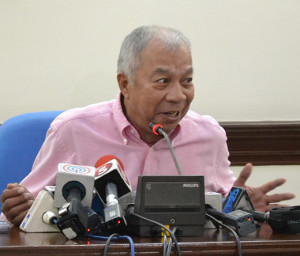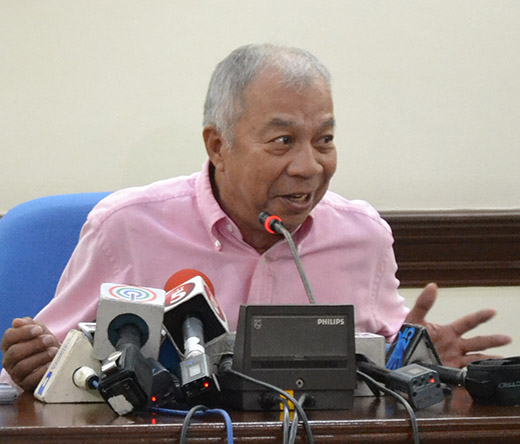
Customs commissioner Alberto Lina said the transfer of a Bureau of Customs (BOC) official supposedly investigating one of his companies for unliquidated shipments was a process that began with his predecessor John Phillip Sevilla.
Under Customs Personnel Order (CPO) No. B-107-2015, Lina signed the transfer of Atty Leonardo Peralta, head of the Customs Intelligence and Investigation Service (CIIS), to the Customs Policy Research Office (CPRO). No reason was given for the transfer to the CPRO, referred to as the “freezer” of the BOC’s mother agency, the Department of Finance (DOF), where personnel are generally thought to have a floating status.
The CIIS is looking into alleged unliquidated shipments involving one of the many companies of Lina, U-Freight Philippines, Inc.
Lina heads 18 companies, six of which offer logistics services and has direct dealings with the BOC. He said he will divest from all of these entities, including those that have nothing to do with logistics.
The customs chief said he only signed the CPO transferring Peralta, and that there was already a recommendation for such by his predecessor Sevilla, who resigned on April 23. He noted he only assumed office on April 24.
Asked why Peralta was transferred, Lina said: “I really do not know. I just signed it (CPO)… that is the prerogative of the commissioner and the Department of Finance.”
The customs chief said he was not aware that it was Peralta who was looking into the U-Freight case.
Deputy Commissioner for the Intelligence Group Jessie Dellosa, Peralta’s immediate supervisor, was not consulted on the transfer. In a memo, he said, “Please be informed that the sudden transfer of Atty. Peralta to the Customs Policy Research Office caught the Intelligence Group by surprise as no prior consultation or comment was sought from me”, leaving the unit unprepared for the cases Peralta was handling.
U-Freight issue
Lina earlier refuted reports that the government lost P1.5 billion in revenues due to U-Freight’s alleged failure to liquidate an undisclosed number of shipments at its Pasay facility.
Initial BOC investigation showed the shipments, which arrived in the country between 2011 and 2013 and were subsequently stored in U-Freight’s facility located near Naia Terminal 2, “could not be accounted for and remained unliquidated.”
The BOC inquiry was based on a 2014 memo issued by then Commissioner Sevilla directing all Customs collection districts nationwide to conduct an “inventory of all overstaying cargoes” within their respective jurisdictions.
Lina explained that U-Freight is not a party to the importation of ZestAir (now Air Asia Zest), the shipments’ importer of record, and that the process of liquidating the bonds covering the aircraft of ZestAir was done by Zest Air’s new customs broker.
The transfer of the shipment to ZestAir’s facility was with the “imprimatur of customs officials”, according to the airline’s customs broker in a letter sent to the BOC dated May 24, 2014, Lina pointed out.
In view of the urgency of its operations, the customs chief said ZestAir submitted letters to the deputy collector for operations of Ninoy Aquino International Airport to release its shipment under guard, which were subsequently approved by the same Customs official.
Lina noted that BOC allows tentative release of shipments, provided this is approved by the BOC. If there are anomalies discovered later, the government can run after the importer through the post-entry audit group, now the Fiscal Intelligence Unit under the Department of Finance, he said.
Zest Air, Lina explained, also holds a congressional franchise and enjoyed duty and tax exemption. In the end, the shipments were released following payment of duties equivalent to 1%, since the shipments had been classified as spare parts.
“Zest Air, through its brokers (past and present) are still in the process of having the DOF Exemption Certificates issued for the remaining shipments covered in this issue,” he said.
As for the supposed questionable stay of a helicopter in Cargohaus, a customs bonded-warehouse under the Lina Group, the customs chief said Cargohaus does not have control over what shipments end up in its facilities and is not in a position to determine authenticity of documents presented by the importer or customs broker to BOC.
Reports also cited another company associated with the Lina Group, E-Konek, a BOC-accredited value added service provider (VASP), as being tapped by BOC and reportedly being paid P500 million a year by the government. Guillermo Parayno, a former customs commissioner, is president of E-Konek. Parayno was also once commissioner of the Bureau of Internal Revenue.
Lina said E-Konek is only one of BOC’s accredited VASPs and payments come from the transacting public and not from the government. The facility of E-Konek, apart from the other two VASPs InterCommerce Network Services and Cargo Data Exchange Corp’s, is used by importers and brokers to lodge their entries with the BOC.
Another issue of conflict of interest resurrected since Lina’s assumption into office at the BOC involves LGC Logistics. In 2005, three congressmen exposed the alleged irregular P100-million contract per year of LGC Logistics.
Under BOC Customs Administrative Order No. 02-2005, LGC Logistics was classified as an inland clearance depot. Lina said although CAO 2-2005 exists, “no transaction using CAO 2-2005 has been completed to date. As a matter of fact, no Customs-PEZA (Philippine Export Processing Authority) Clearance Office (CPCO) has been detailed in the LGC Logistics premises (up to present) to give effect to the said CAO. LGC Logistics is using the CPCO assigned at the Carmelray Industrial Park (CIP) II, like the rest of the locators at CIP II. Hence, the alleged undue advantage and conflict of interest is non-existent,” Lina explained.
The customs chief’s name was also dragged in a controversy during the 2013 elections when Air21, another one of his companies, bagged an alleged anomalous contract with the Commission on Elections (Comelec) for the deployment of election paraphernalia in Mindanao.
Lina said Air21 won the project in a public bidding participated in by seven bidders.
As for reports claiming he contributed a large amount of money to the campaign kitty of then senator and presidential candidate Benigno Aquino III and his defeated running-mate, former senator Manuel Roxas II, Lina said “the campaign fund issue is just the personal opinion of the person who mentioned it.”
Lina reiterated he accepted the post in BOC because of “love for the country.”
He added he will continue the reforms started by Sevilla and will even fast rack some, especially projects involving automation.
Divestment of shares
The customs chief said he will resign as chairman of businesses under the Lina Group of Companies (LGC).
In a statement, Lina said he has already resigned as chairman of the companies and vacated his seat as director of all firms under LGC. He will likewise resign as independent director of Philippine Airlines.
In a meet and greet with media on April 29, Lina said shares of his wife and children will be divested; he also wants to let go even of LGC companies that do not directly transact with BOC, to remove doubts of conflict of interest.
He added his lawyers are preparing the necessary documents for the sale of his shares and taxes that need to be paid.
Lina has 30 days from assumption of office to resign from his private companies, and 60 days to divest of his shareholdings.





